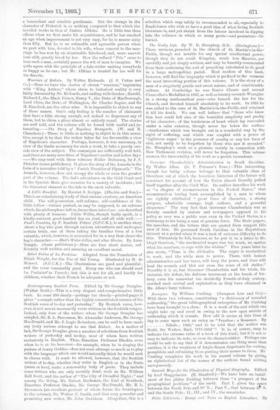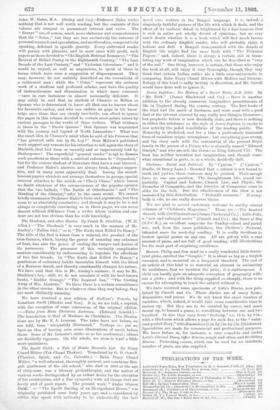Police Litteraria : Essays and Notes on English Literature. By
John W. Hales, M.A. (Seeley and Co.)—Professor Hales writes nothing that is not well worth reading, but the contents of this volume are unequal in permanent interest and value. The " Essays " are, of course, much more elaborate and comprehensive than the "Notes ;" but they are less exclusively the outcome of personal research and speculation, and are therefore, comparatively speaking, deficient in specific gravity. Every cultivated reader will peruse with pleasure, and in most cases with profit, such papers as those devoted to "Old English Metrical Romances," "The Revival of Ballad Poetry in the Eighteenth Century," "The Last Decade of the Last Century," and "Victorian Literature ;" and it would be unjust, as well as ungracious, to speak of them in terms which have even a suggestion of disparagement. They may, however, be not unfairly described as the recreations of a cultivated man ; while the " Notes " represent the arduous work of a studious and profound scholar, and have the quality of instructiveness and illumination in which mere comment —save in rare instances—is almost necessarily deficient. It may safely be said that no student of Chaucer or Milton or Spenser who is determined to know all that can be known about his favourite author, and who can endure no gaps in his know- ledge save those that are clearly inevitable, can afford to ignore the pages in this volume devoted to certain moot-points raised by various passages in the works of these writers. What evidence is there in the " Faerie Queene" that Spenser was acquainted with the scenery and legend of North Lancashire ? What was the exact idea in Chaucer's mind when he said of his Prioress that "her greatest oath was by St. Loy?" Does Milton's published work suggest any reasons for his intention to tell again the story of Macbeth, that had been so recently and so impressively told by Shakespeare ? The superficial "general reader" is apt to dismiss such questions as these with a satirical reference to " Dryasdust," but for the serious student of literature they have a real interest ; and Professor Hales's answers are always fresh, always sugges- tive, and in many cases apparently final. Among the miscel- laneous papers which do not arrange themselves in groups, special interest attaches to the article on "Chevy Chase," which leaves no doubt whatever of the erroneousness of the popular opinion that the two ballads, "The Battle of Otterlaourne" and "The Hunting of the Cheviot," refer to the same event. We cannot briefly summarise Professor Hales's facts and arguments, but they seem to us absolutely conclusive ; and though it may be he is not always so completely convincing as in these pages, we can never dissent without diffidence from a writer whose caution and can- dour are not less obvious than his wide knowledge.







































 Previous page
Previous page